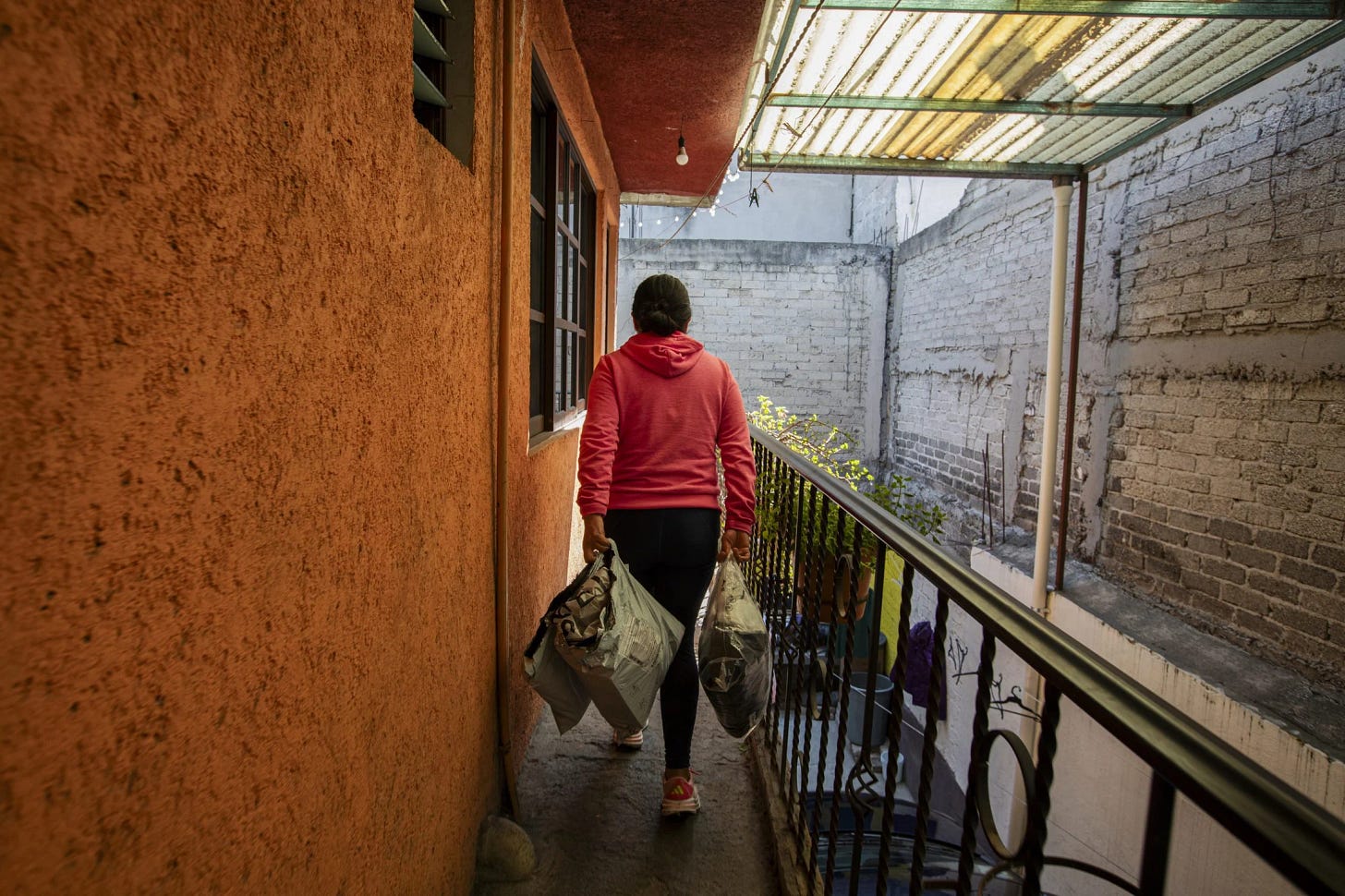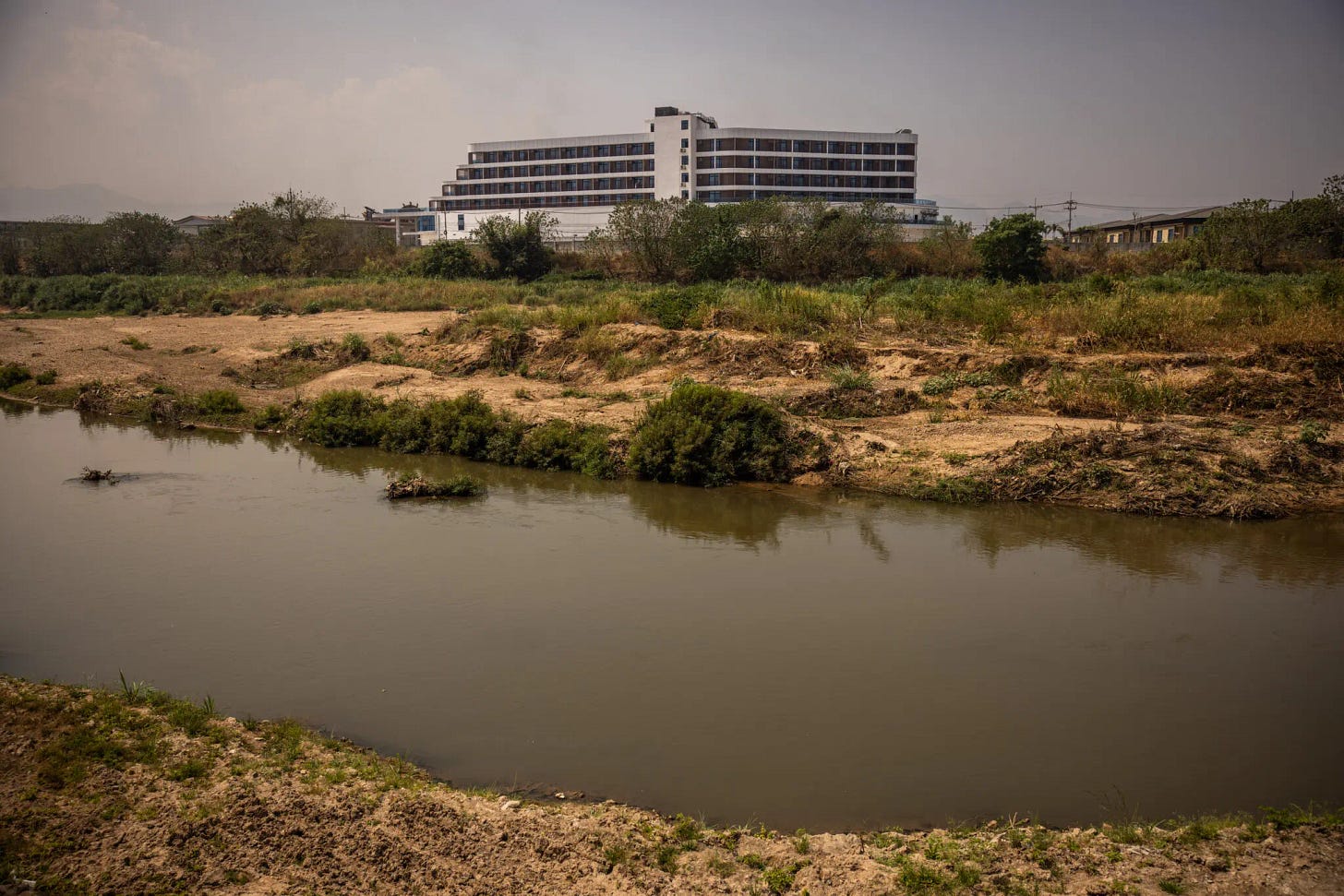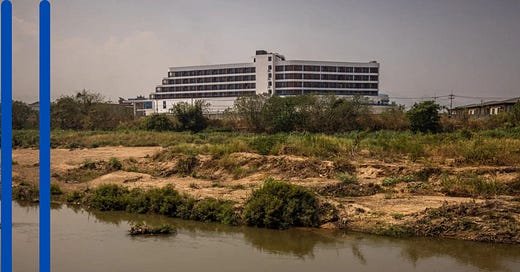“The Intersection” is your bi-weekly briefing on global affairs, human rights, sustainability, social innovation, culture, and design—offering fresh insights through the lenses of sustainable development, women-centered perspectives, and emerging global trends. The aim? To keep you informed, curious, and always ready with a compelling conversation starter at the dinner table.’’
Democratic women wore pink and white at last night’s Trump speech.
The US Supreme Court has ruled 5-4 to lift a pause on foreign aid funding, forcing the Trump administration to restart disbursements to USAID contractors.
How Airbnb and Booking.com help Israelis make money from stolen Palestinian land.
US First Lady Melania Trump visited Capitol Hill this week to discuss the Take It Down Act, a bill that would expedite the process of removing revenge porn material from the internet. The bill has already been approved by the Senate and must pass the House before ending up with President Trump.
“There are only two people you need to make proud in your life. Five-year-old you and 80-year-old you.” — Amanda Nguyen, CEO of Rise and author of the Sexual Assault Survivors’ Rights Act, in her new memoir Saving Five.
Global Affairs

In a bid to protect local manufacturing and curb the impact of Chinese fast fashion, Mexico has introduced a 19% import tax on goods from non-trade agreement countries, including China. This move, aimed at addressing the loss of 79,000 textile jobs and revitalizing domestic production, has disrupted the operations of e-commerce platforms like Shein, Temu, and Alibaba, alongside the millions of local resellers who depend on them. These resellers, often women running informal businesses, are now grappling with rising costs and thinner profit margins, as many refuse to register with the tax authority. While the tax may encourage nearshoring efforts from Asian companies, it has already spurred price hikes, with resellers like Lucía and Nayeli seeing their earnings squeezed as they strive to maintain customer loyalty in the face of increased costs. While the government hopes to push for a more robust domestic industry, the policy may also drive consumers to informal markets, where products evade taxation. Meanwhile, the global e-commerce landscape continues to shift, with other nations like Colombia and Malaysia following suit, and Mexico negotiating with platforms such as Amazon to bolster regional trade. However, experts suggest stricter regulations and improved domestic production may be more effective long-term solutions.
Arab leaders have endorsed an Egyptian-led reconstruction plan for Gaza, positioning it as an official Arab League initiative that rejects forced displacement and charts a structured path for rebuilding. The plan, developed in partnership with Palestine, prioritizes clearing debris, restoring essential services, and securing international funding through a World Bank-administered trust. It also envisions long-term urban renewal, including green housing, industrial zones, and critical infrastructure projects. Beyond reconstruction, the initiative seeks to establish a new political and security framework for Gaza while preserving its legal status within a future Palestinian state. Egypt will host an international conference to mobilize global support, while the Arab League urges the UN to deploy peacekeepers to stabilize the region.
EU leaders are pushing for greater security self-sufficiency in the wake of the US’s waning support for Ukraine and European defense. Ursula von der Leyen’s €800 billion “ReArm Europe” plan aims to bolster the continent’s military capabilities by enabling joint defense procurement and loosening fiscal constraints, allowing governments to exceed debt limits for defense spending. The plan, unveiled ahead of a summit, is designed to ease Europe’s reliance on the US and enhance collective security, with provisions for €150 billion in loans to support joint purchases of advanced military technologies like air defense, drones, and cyber capabilities. Despite resistance from countries like Hungary and Slovakia, there is growing momentum for the proposal, especially after the US suspended its aid to Ukraine. Countries like Sweden and Germany, previously reluctant to expand EU defense powers, have shifted positions, recognizing the urgency of strengthening Europe’s defense capabilities. The ReArm Europe initiative is viewed as a pivotal step in creating a more autonomous and self-sustaining European defense system, signaling a new era of European military cohesion.
In 1963, nearly three dozen newly independent African nations formed the Organization of African Unity, embracing the inviolability of colonial-era borders to prevent irredentist claims that could destabilize the continent. Despite periodic violations, this principle has largely held. However, Rwanda's ongoing support for the M23 rebel group in eastern Congo, which has seized significant territories like Goma and Bukavu, threatens to unravel this order. The West's response has been tepid, with limited sanctions and aid suspensions, while African leaders appear reluctant to intervene. The situation suggests that Rwanda, under President Paul Kagame, may be pursuing a strategy of territorial expansion, potentially redrawing colonial-era borders and undermining a key pillar of international order. As the M23 advances, the risk of a broader war looms, and the West's failure to act decisively may have far-reaching implications for regional stability and global geopolitics.
Since 2020, Americans have splurged on discretionary goods while basic necessities surged in price. Consumer debt has soared, with credit card defaults now at levels not seen since the Great Recession. Yet, who is still booking first-class flights and attending sold-out concerts? According to Bloomberg, it’s the wealthiest 10% of American households—those earning over $250,000 annually—who are now responsible for half of all U.S. consumer spending and a third of the nation's GDP. This growing disparity between the spending habits of the rich and the rest of the country is pushing economic boundaries, contributing to rising fragility and a distortion of the broader economic picture. With such concentrated financial power, the risk is clear: a small group’s spending might keep the economy in motion, but it also leaves it vulnerable to collapse.
Human Rights

Mae Sot, a Thai border town with no regular international flights, has recently seen hundreds of people airlifted home to China—rescued from Myanmar’s sprawling online scam compounds, where forced labor fuels a multibillion-dollar fraud industry. These high-rise crime hubs, thriving in the lawlessness that followed Myanmar’s 2021 coup, remain untouched despite recent raids, with construction continuing unabated. While China, Thailand, and Myanmar tout joint crackdowns, the masterminds behind these operations remain at large, and thousands of trafficked workers are still trapped in digital sweatshops, coerced into scamming victims worldwide. As political and criminal interests intertwine, dismantling this empire of deception demands more than performative enforcement.
Thailand has been condemned for its controversial deportation of Uyghur refugees, with critics calling the move “shameful.” Despite United Nations warnings that deportees faced a “real risk of torture,” Thailand claimed the return was voluntary, stating the individuals would resume “normal lives” with their families. However, the family of one deportee, who fled China in 2014, vehemently refutes this, emphasizing that no one would willingly return to a regime known for human rights abuses, including forced labour and the incarceration of up to a million Uyghurs. Aisha, whose husband was detained in Thailand, shared the heart-wrenching correspondence between her 10-year-old daughter and her father, who may never see his children again. “Who wants their family to be sent back to a place like that?” she asked, condemning Thailand’s complicity.
The exodus of Uyghurs from China’s Xinjiang region, where Beijing stands accused of systemic abuse, has intensified over the last decade. Despite China's denials, testimonies from the deportees and their families paint a grim picture, with letters revealing detainees’ desperation not to return to China. They reported being coerced into signing documents consenting to their repatriation, with threats of imprisonment or death awaiting them. Thailand, however, reassured the public that China had promised safe reintegration and vocational support, a term often linked to China's notorious detention camps. The international community has rightly questioned Thailand's role in facilitating such a dangerous, unjust repatriation.
UN human rights chief Volker Türk has voiced deep concern over a “fundamental shift” in the US, warning of growing influence among “unelected tech oligarchs” and a rollback on gender equality and anti-discrimination policies. Without naming Trump, Türk criticized the administration’s attacks on the press, erosion of diversity initiatives, and threats to democratic norms, as Washington distances itself from global institutions while tightening its grip on domestic policy. Meanwhile, Silicon Valley’s billionaires consolidate power, with figures like Elon Musk and Mark Zuckerberg accused of enabling disinformation and polarization. “Any form of unregulated power can lead to oppression,” Türk cautioned, underscoring the fragility of the international order.
The European Union’s proposed ‘Omnibus Simplification Package’ threatens to undermine years of progress in corporate accountability, modern slavery prevention, and human rights protections. By rolling the Corporate Sustainability Due Diligence Directive (CSDDD) into a broader regulatory package, the European Commission risks diluting key provisions that require businesses to identify and mitigate environmental and human rights abuses in their supply chains. With opposition from right-wing politicians and business lobbyists mounting, the directive—hard-won after years of negotiation—now faces the threat of significant weakening or outright abandonment.
The proposed revisions would dramatically narrow the scope of corporate accountability, reducing the number of companies required to comply, limiting due diligence to direct suppliers, and removing civil liability. These changes, along with delays to implementation, could allow exploitative labour practices to persist unchecked. Business leaders and financial experts warn that ongoing legislative uncertainty hampers responsible planning, while human rights groups stress that weakening these laws would erode the EU’s global credibility. At a time when supply chains demand more oversight, not less, Brussels must decide whether it is serious about ethical business—or willing to cede ground to corporate interests at the expense of the world’s most vulnerable workers.
Environment
The U.S. Supreme Court is set to hear a case that could determine whether Texas becomes home to the nation’s first independent repository for spent nuclear fuel—a prospect that has sparked fierce opposition from state leaders. At issue is the Nuclear Regulatory Commission’s (NRC) authority to license a temporary storage facility for high-level nuclear waste in West Texas, a plan contested by both state officials and Fasken Oil, who argue that such a site risks becoming a permanent dumping ground. While the NRC contends that its licensing decision aligns with federal law, a lower court sided with Texas last year, ruling that existing statutes mandate storage at reactor sites or federal facilities. The Supreme Court’s review, expected to conclude by June, will weigh not just the legality of the NRC’s actions but also broader questions about the future of America’s nuclear industry. With reactor sites accumulating more than 2,000 tons of spent fuel annually and no permanent disposal site in sight, Texas—already a hub for uranium mining and reactor development—could find itself at the center of the nation’s atomic future, whether it welcomes the role or not.
Japan’s largest wildfire in decades continues to rage in Ofunato, forcing thousands to evacuate as firefighters battle the relentless blaze. The fire, which has spread across 2,100 hectares and damaged over 80 buildings, has been fueled by an unusually dry winter and strong winds, with the region recording its lowest February rainfall in over 20 years. More than 2,000 firefighters and self-defense force personnel have been deployed, supported by aerial water drops, yet containment remains elusive. Prime Minister Shigeru Ishiba has vowed full intervention to protect homes, while meteorologists anticipate snow and rain could bring relief by midweek.
Mars has committed $27 million to reduce dairy farming emissions through its partnership with New Zealand’s Fonterra. The five-year investment will support around 2,000 farmers with sustainable farming tools and technology, while rewarding those who meet emissions targets with up to $15,000 annually. Dairy is Mars’ fourth-largest carbon footprint contributor, and the Farmer Forward Program, covering 26,000 hectares, is part of a broader effort to cut emissions by more than 150,000 metric tons by 2030. This initiative follows similar moves by Nestlé and other global companies, as partnerships continue to grow to help farmers adopt more sustainable practices and reduce their environmental impact.
Indigenous leaders from the Peruvian Amazon have taken their fight against oil and gas projects to the Inter-American Commission on Human Rights, arguing that government-backed concessions—covering 75% of the region—violate their rights, threaten uncontacted tribes, and endanger the environment. Despite official assurances of democratic accountability, activists highlight ongoing contamination, weakened environmental regulations, and a disregard for consultation protocols. With over 800 documented oil spills and increasing conflicts near extraction sites, Indigenous groups are now seeking international intervention to hold Peru to its legal commitments and halt the encroachment on their ancestral lands.
Social Innovation
Goldman Sachs has launched a pioneering biodiversity bond fund, one of the first fixed-income funds focused on biodiversity conservation and aligned with the UN’s Sustainable Development Goals. The fund, listed in the EU, allows investors to support projects dedicated to protecting ecosystems and promoting sustainable water use. With at least 90% of investments earmarked for sustainability, the fund will exclude companies involved in fossil fuel extraction and controversial activities. This move highlights a growing investor interest in biodiversity, with Goldman Sachs integrating ESG analysis into its selection process to ensure positive environmental impact.
The UK government has launched PackUK, the new administrator for the Extended Producer Responsibility for packaging (pEPR), aimed at driving sustainable packaging practices. The British beauty industry has long been at the forefront of sustainability, from refillable products to in-store take-back schemes, yet packaging still represents 70% of its waste. Research from the British Beauty Council highlights that 56% of UK consumers don’t recycle bathroom products, citing inconvenience. PackUK’s role is pivotal in ensuring businesses comply with pEPR, shifting the cost of managing packaging waste from taxpayers to producers. This initiative promises to boost investment in local recycling services, potentially creating 21,000 new jobs and contributing £10 billion over the next decade. The government’s push aligns with the broader sustainable movement, exemplified by initiatives like the Great British Beauty Clean Up, launching in 2025, which aims to enhance consumer awareness of recycling options and foster industry collaboration.
Culture & Design

Hawai‘i is championing the restoration of kava, its traditional Polynesian beverage, by bypassing federal ambiguities and designating it as "generally recognized as safe" (GRAS). This decision honors the plant’s cultural legacy while enabling its environmental and economic potential. Kava, a calming root drink, was once suppressed during colonization but has since gained traction through small-scale farming efforts and the Hawaiian Renaissance. Despite federal skepticism, Hawai‘i’s move reflects a growing recognition of the plant’s importance, offering a sustainable path for Native crops and local food sovereignty. Kava’s medicinal properties, once overshadowed by myths and regulatory hurdles, are now gaining wider acceptance, with new research pointing to its anti-anxiety benefits. As demand for the drink rises, so do opportunities for local agriculture, with kava bars proliferating across the U.S. and states like Michigan and Hawai‘i leading the charge in granting GRAS status. This renewed recognition paves the way for kava’s future role in both preserving cultural heritage and fostering sustainable agricultural practices.
A new stage adaptation of The Cry of Winnie Mandela brings the complex legacy of anti-apartheid icon Winnie Madikizela-Mandela to Johannesburg’s Market Theatre. Adapted from Njabulo Ndebele’s novel, the play delves into the struggles of Black South African women who endured years of separation from their husbands due to exile, imprisonment, or labor migration under apartheid. Directed by Momo Matsunyane, it examines themes of loneliness, betrayal, and resilience, framing Madikizela-Mandela’s turbulent life within the broader narrative of women left waiting. The production does not shy away from her political and personal controversies, including her appearance before the Truth and Reconciliation Commission and her high-profile divorce from Nelson Mandela. With a cast led by Thembisa Mdoda and infused with protest music from the era, the play offers a poignant meditation on power, sacrifice, and the meaning of survival.
In a promising sign for the global film industry, French cinema is experiencing a resurgence, defying pandemic setbacks and proving that the art of moviegoing is far from obsolete. Despite global declines in cinema attendance, France saw a rise in moviegoers in 2023, with over 181 million tickets sold. This revival is attributed to a deep-rooted cultural reverence for cinema, supported by government policies that encourage frequent moviegoing, from subsidized school trips to small-town screenings. Paris, with its historic theaters and vibrant art-house scene, remains the epicenter of this cinematic renaissance, bolstered by innovative renovations like the Pathé Palace and the ongoing restoration of La Pagode. The French view the cinema as a social contract—an essential cultural experience that continues to thrive.
Following in the footsteps of New York, Massachusetts, and Washington, California is pushing for its own Fashion Act to hold brands and retailers accountable for the environmental and chemical impacts of the fashion industry. Introduced by Assemblymember Dawn Addis, the Fashion Environmental Accountability Act (AB 405) would require companies with more than $100 million in global revenue to disclose and reduce supply chain emissions in line with Paris Agreement targets, manage chemical use, and ensure wastewater testing. The bill aims to tackle the growing fashion industry’s contribution to climate change and toxic waste, with penalties of up to 2% of annual revenue for non-compliance. California, alongside New York, has long been a leader in fashion and culture, and this legislation seeks to align environmental responsibility with industry innovation. Brands like Patagonia, Reformation, and Stella McCartney support the bill, arguing that regulatory action is crucial to effect real change in the sector. As the federal government rolls back environmental protections, states are stepping up to lead the charge for a more sustainable future.
Elise "Lise" Meitner (1878-1968) was an Austrian-Swedish physicist whose pivotal contributions led to the discovery of nuclear fission. Born in Vienna on November 7, 1878, she rose through the ranks of the scientific community despite the many obstacles posed by her gender and heritage. Meitner earned her doctorate in 1906, becoming the second woman in Vienna's University of Vienna to do so. By the time she began collaborating with Otto Hahn at the Kaiser Wilhelm Institute for Chemistry in Berlin, she had already made significant contributions to the field of radioactivity. In the late 1930s, amidst rising Nazi persecution, Meitner fled to Sweden, where she continued her work until her death in 1968.
Meitner's most renowned achievement came in 1938 when she and her nephew Otto Robert Frisch deciphered the physics behind the phenomenon of nuclear fission, discovered by Hahn and Fritz Strassmann. Their collaborative work confirmed the fission process and coined the term "fission," which would become central to the development of nuclear technology. Despite her critical role in this breakthrough, Meitner was excluded from the 1944 Nobel Prize in Chemistry, which was awarded to Hahn. Her exclusion remains a point of contention, with many considering it an oversight of her scientific achievements. Nevertheless, she was repeatedly nominated for the Nobel Prize, with 19 nominations for Chemistry and 30 for Physics, though she never received one.
Meitner's early years were marked by an intense curiosity about the natural world. From a young age, she pursued scientific knowledge with an unyielding passion, despite the societal limitations placed on women in the field. Her academic journey began at the University of Vienna, where she earned her doctorate under the mentorship of Franz Exner. Afterward, she moved to Berlin to work with Max Planck and Otto Hahn, where she made substantial contributions to understanding radioactive decay and the development of new elements. Throughout her career, Meitner faced the challenge of balancing scientific rigor with the barriers of being a woman in a male-dominated field. Yet, her legacy endures as one of the foremost physicists of the 20th century.
Anything interesting to share with me?
Jennifer
xxx







